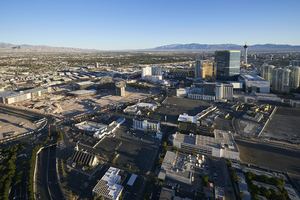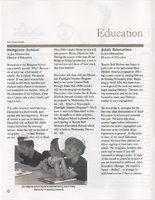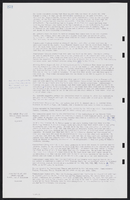Search the Special Collections and Archives Portal
Search Results

Casino Projects on the Las Vegas Strip from the Air, Las Vegas, Nevada: digital photograph
Date
Archival Collection
Description
Image
Arthur G. Grant Photograph Collection
Identifier
Abstract
Arthur G. Grant Photograph Collection (approximately 1950-1965) consists of 120mm and 35mm color photographic slides taken in the mid-1950s in and around Las Vegas, Nevada. Images depict Arthur G. Grant's home life, the Fortune Club business on Fremont Street, general downtown, Helldorado Parade, and a Mount Charleston picnic. The collection also contains images of Lake Mead boat races including an appearance by Donald Campbell and his water speed world record-setting jet powered boat, Bluebird.
Archival Collection

Transcript of interview with Ernest Jackson Jr. by Larry E. Cooper, March 1, 1980
Date
Archival Collection
Description
On March 1, 1980, Larry E. Cooper interviewed general contractor Ernest (Ernie) Jackson Junior (born December 6th, 1932 in Bruce, Mississippi) in Cooper’s home about his experiences in the Westside as a Black Las Vegas resident. Jackson Jr. discusses the lack of property buyers on the Westside and his goals of improving the Westside by building on the land. Jackson Jr. also discusses his youth as a baseball star for Las Vegas High School in the fifties.
Text

Transcript of interview with Jack Bullock by Julie Domonkos, March 15, 1981
Date
Archival Collection
Description
Text

Transcript of interview with Norma Friedman by Barbara Tabach, November 19, 2015 and April 06, 2016
Date
Archival Collection
Description
It was a scorching Fourth of July, when Norma (n?e Adler) and Leon Friedman rolled into their new home of Las Vegas in 1973. Nevertheless, they were content with leaving Gary, Indiana behind, and starting fresh with the family?s new ownership of Walker Furniture. Norma recalls her first stop in checking out Las Vegas was to visit the synagogue ? Temple Beth Sholom being the only option. Her oldest son would soon become a bar mitzvah. Feeling good about that, she and her sister-in-law who was also relocating to Las Vegas for the furniture business, searched for new homes. Norma settled into the community through volunteer work as well as through employment outside the family business. She worked in the real estate briefly and in a jewelry store at the Dunes. A natural organizer, she immersed herself in religious and civic organizations including the Jewish Federation, Jewish Family Service Agency, and volunteering at Selma Bartlett Elementary School in Henderson. Norma shares stories of her Jewish heritage and upbringing in Pittsburgh, the decision to move to Las Vegas, making fast friendships during her life in Las Vegas and the joy she has in traveling the world with Leon, who passed in 2004. In 2017, Norma was honored by the Jewish Family Service Agency.
Text





